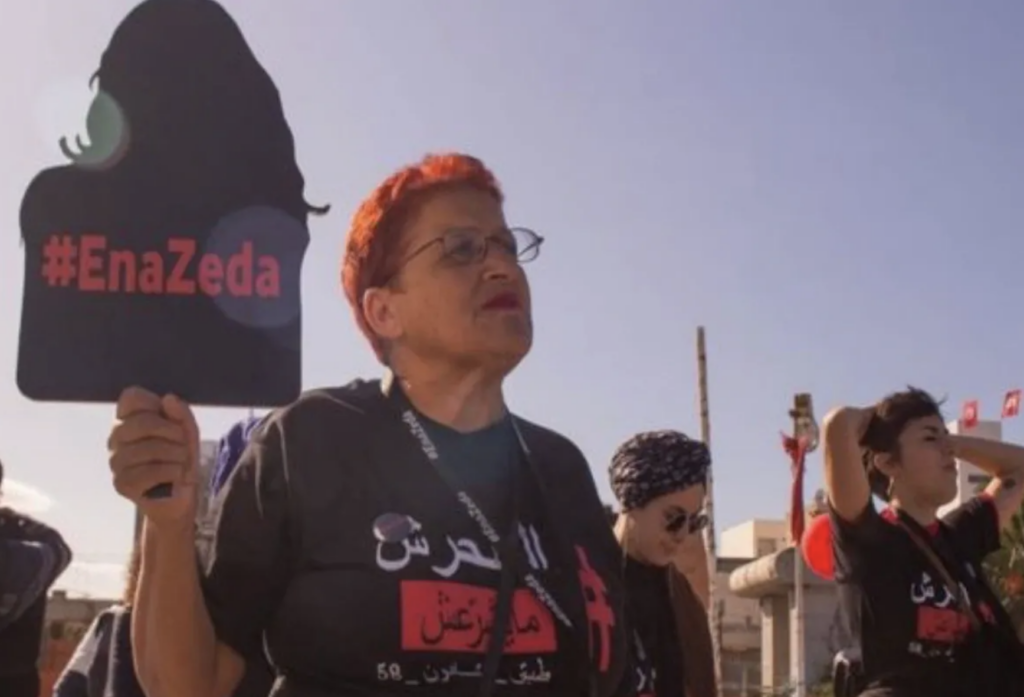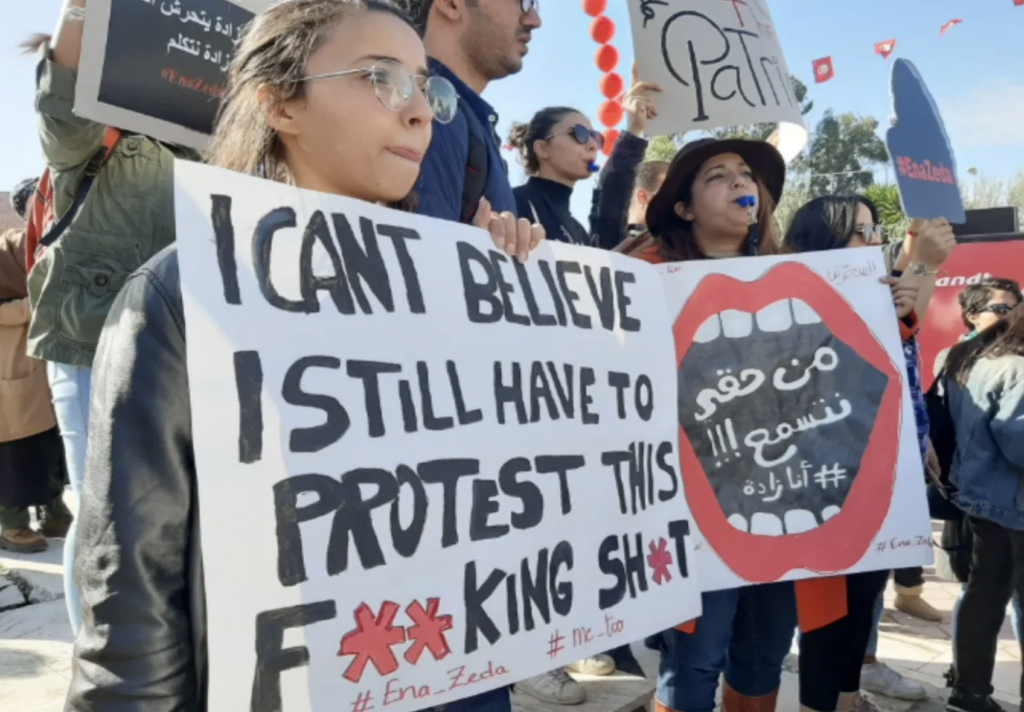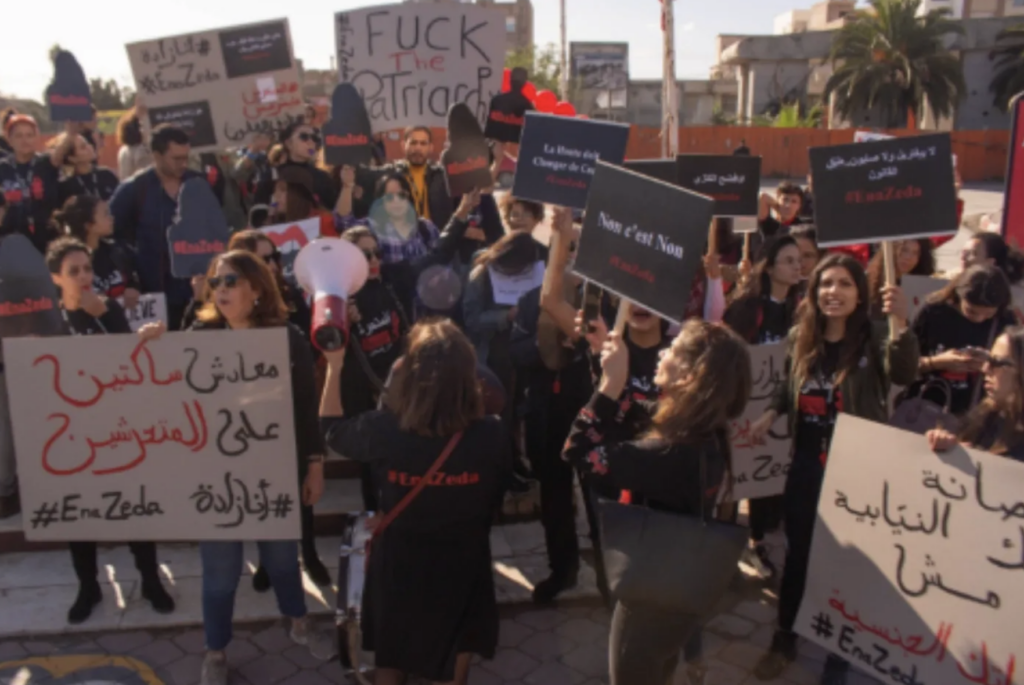In the Middle East and North Africa (MENA) region, public debate about issues of a sexual nature is not common. Even less common is to hear public accounts of sexual violence or abuse. This is why a social movement in Tunisia has sparked a new wave of testimony and solidarity amongst thousands of Tunisian citizens.
In recent weeks, the #EnaZeda (‘#MeToo’ in Tunisian Arabic) movement has emerged. It
has provided a platform for members of Tunisian society to discuss their experiences of sexual harassment and assault, paedophilia, and incest. Aswaat Nisaa (‘Women’s Voices’, a non-governmental women’s rights group) coined the hashtag and created a closed Facebook group for people to share their stories. At the time of writing, the group has more than 26 000 members.
The seeds of #EnaZeda stem from a parked car in a city on the Mediterranean Coast. In Tunisia’s Parliamentary Elections on 6th October 2019, Zouheir Makhlouf was elected to represent Nabeul, a city 60km southeast of Tunis. Four days later, a 19 year old student posted photographs of the politician online, which quickly went viral. The photographs show Makhlouf sitting in a car outside the student’s Nabeul high school. The student claims that the photographs depict Makhlouf masturbating and sexually harassing her from his car. She posted the photographs, along with her testimony, to a private Facebook group. What followed was a flood of outrage and condemnation of Makhlouf from across the country.
In the aftermath of the post, Aswaat Nisaa’s ‘#EnaZeda’ Facebook group was born. The safe space forum has seen Tunisians (women and men) from different walks of life sharing their experiences with each other. The group’s members have commented and posted over 70 000 times, and Aswaat Nisaa have organised meetings, seminars, and demonstrations to spread the #EnaZeda message around Tunisia.
The Nabeul student and a team of lawyers also sought criminal charges against Makhlouf. The politician denies any wrongdoing, claiming that he was about to urinate into a bottle (due to him being diabetic) when the photographs were taken. This did not stop the legal case being brought against him, but there have been significant roadblocks in the Prosecution’s way. Once a Tunisian MP assumes office, the Constitution automatically grants them legal immunity (meaning that they cannot be charged for committing a crime). In the run-up to Makhlouf assuming office on 13th November 2019, the student’s legal team were working against the clock. “It is truly a race to get something from the judge before the abuser takes his seat,” Naima Chabbouh, one of the student’s lawyers, commented in the press. According to Chabbouh, the law only protects MPs from criminal charges related to their political role, but that, “depending on the judge, the interpretation of the article can be broadened… wider interpretation could lead to the case being dropped”.
Lawyers also stressed how this case could influence discussions of sexual harassment and violence in Tunisia. “We are pushing for it to be considered as an issue of sexual harassment and not just public indecency, because it could set a legal precedent and actually encourage other women to file a complaint,” commented Malek Ben Jaafer, another of the student’s lawyers. Additionally, the case highlights a potentially worrying trend; “If [Makhlouf] gets immunity, this would make parliament a place to flee from [criminal] charges” Chabbouh added.
Despite the Prosecution’s efforts, Makhlouf entered office on 13th November 2019. At the time of writing, the MP is afforded legal immunity. As a protest, demonstrators gathered outside the Parliament during the first day of session. Some wore ‘#EnaZeda’ t-shirts and others shouted in unison, “A harasser should not be a lawmaker”.
Currently, the case is still under review by a magistrate. Only time will tell how the magistrate will interpret the immunity law, and whether Makhlouf will be formally sentenced. However, these events have opened a dialogue in Tunisia about the prevalence of sexual harassment and abuse. The founders of the #EnaZeda Facebook group were taken by surprise by the many stories shared online; Rania Said, a group moderator, told the BBC “Paedophilia and incest are more rampant than we would like to admit… many, many families are hiding this, and many families don’t even know how to deal with this”. Aswaat Nisaa are also in the process of establishing a legal case accusing a university professor of sexual misconduct. This action was taken after several women posted about their experiences with the same professor in the #EnaZeda group.
Clearly, although the results of Makhlouf’s charges are still pending, this case has already struck a chord with many Tunisians. Some are daring to ask uncomfortable but pressing
questions, and #EnaZeda has opened a platform of discussion and support. The fact that such events are taking place in Tunisia is significant; the country is widely seen as having one of the most progressive legal systems in the MENA region, especially relating to gender issues. When Tunisia gained independence from France in 1956, Prime Minister Bourguiba introduced the Code of Personal Status law. This revolutionised women’s access to political, economic, and social rights; for example, polygamy (a man marrying several wives) was banned, divorce became a legal rather than a religious procedure, and consent from both man and woman was needed before a marriage could take place. By the late 1950s, women could vote and run for political office. In 1973, abortions under certain circumstances were legalised, and in 1993 domestic violence was criminalised. After the Arab Spring of 2011 (which started in Tunisia and spread around the MENA region), more reforms were made. For example, a new Constitution was passed in 2014, stating that men and women, “have equal rights and duties, and are equal before the law without any discrimination”.
Conversations about gender and equality are currently rife in Tunisia, and the discussions are far from over. The world should continue to watch how events unfold in the coming weeks and months – only then can we assess the long-term influence of #EnaZeda on Tunisian society.



